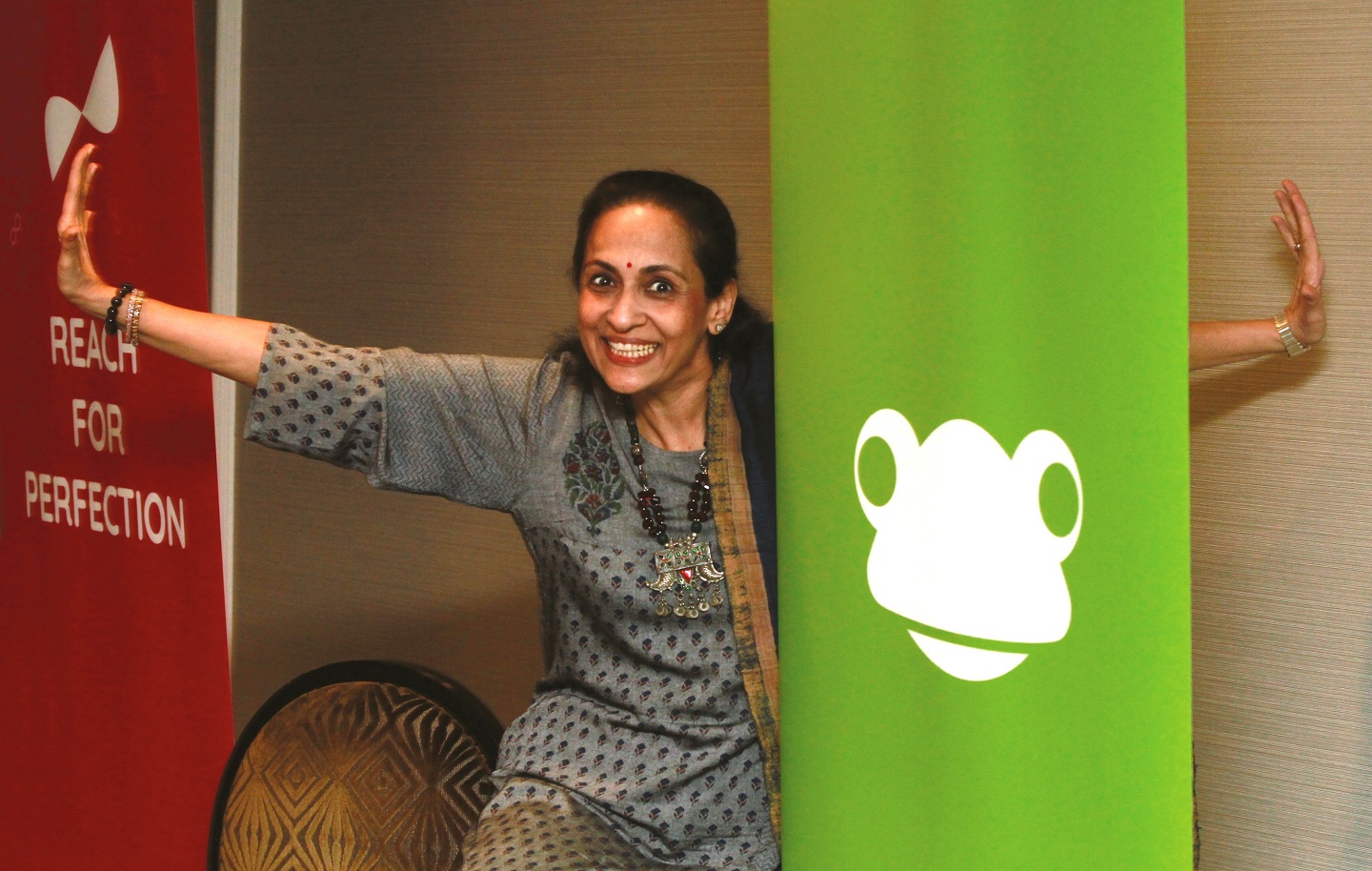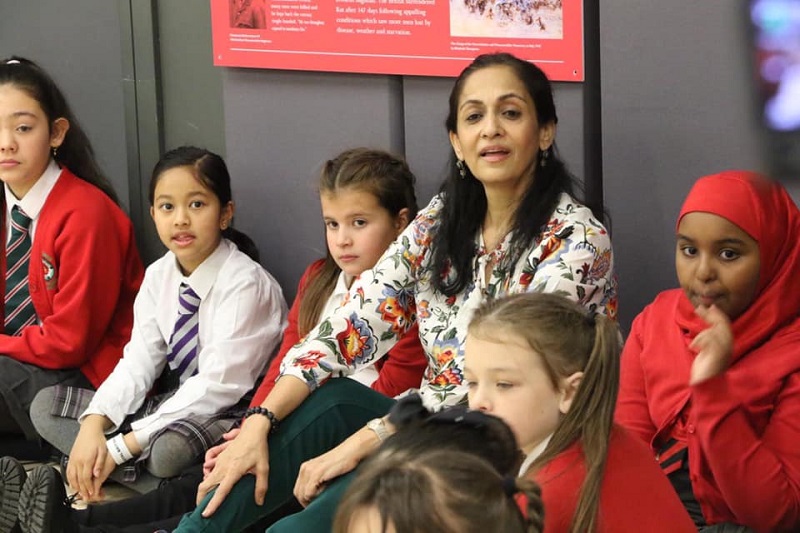
Swaroop Rawal, one of the 10 finalists for the Varkey Foundation’s Global Teacher Prize 2019 (Photo: Chu Juck Seng/The Edge)
There is no child in the world who does not want to learn, but sometimes, teachers make it so terrible for them that they just cannot do so. You hear of teachers being very mean, or they make learning so boring. That never happens in my class. They all come running because it is fun,” says Swaroop Rawal, one of the 10 finalists for the Varkey Foundation’s Global Teacher Prize 2019.
The first thing she does when conducting teacher training is to remind trainees that there are three professions in the world based on care — medicine, nursing and teaching. “If you don’t care, get out. Children want to be cared for, they want to be loved. Every child wants to learn.”
Swaroop was a speaker at the Leaps of Knowledge Conference organised by FrogAsia and supported by YTL Foundation in Kuala Lumpur. The vice-president of the Early Childhood Association India is a special educator who uses drama to teach life skills. “Drama gives children confidence to stand up for their rights,” she says.
A college dropout at 18 — she was doing a bachelor’s in humanities — Swaroop started modelling and designing sets and costumes for a theatre company before venturing into acting on stage and in films and television. Three years later, she became Miss India and represented the country at Miss Universe 1979.
Her father, the chief producer of the Indian National Theatre, was the one who encouraged her to enter the pageant. “He said, ‘If you become Miss India, you get to go abroad’. I said, ‘Wow’. But I think I was destined to be a teacher.”
Marriage — to actor-turned-politician Paresh Rawal — followed by the birth of two sons, now aged 30 and 28, turned her focus to education. When the boys were young, the Indian government started an educational programme with a mission: Each One Teach One. “It meant that each educated Indian could teach at least one unlettered countryman. I was greatly influenced by it,” says Mumbai-born Swaroop, whose mother was a surgical oncologist.
At 38, she obtained her master’s degree in English literature from Annamalai Open University. A year later, she was accepted by the University of Worcester, UK, to do her PhD thesis on using the arts as a tool in education and to enhance life skills in children with learning disabilities.
“I had training in theatre from young. So, when I started teaching, it was natural for me to use drama, song, art and games in the classroom. It is the best way to teach because it is experiential education — that is the new buzzword. The debate and lecture format is not working.”
Technology is another new thing teachers and students are being exposed to and Swaroop, whose students range from tribal children to those in rural villages and elite schools, is well prepared, thanks to her years behind the camera. “I did a beautiful programme in Gujarat where I taught 200,000 people simultaneously via satellite. I could do that because I can face the camera very easily and know how to communicate in front of it.”
swaroop_inside.jpg

She teaches life skills — self-esteem, understanding and managing emotions, self-awareness, communication and empathy, problem-solving, decision-making, and creative and critical thinking. In rural areas everywhere, she observes the same dilemma — students who choose not to further their studies need to find a job. Livelihood skills prepare them to go out to work, says Swaroop, who played a part in drafting India’s national vocational framework as chair of entertainment studies. “The policy was implemented five years ago. Now, we are refining it and adding more professions, such as hairdressing and dress designing.”
Mindful of the lot of children born into disadvantaged circumstances, she is constantly looking at giving them alternatives. “Completing ninth grade is good for a proper vocation, but before that, they need to get an idea of what they can do.” Thus, she is advocating pre-vocational education from the second or third year of school.
“Children can be introduced to subjects such as weaving, pottery, painting, bead-making and carpentry from the second or third grade so they learn everything little by little and they can realise what they want to do. The promise of a future vocation will come from there.”
The most satisfying thing about her work, she adds, is when students come back and tell her what she has taught them helps them in real life. “That is what it is about isn’t it — living? If you cannot use your learning in real life, what is the point?”
Swaroop is all for students having more fun in the classroom and less rote learning. With technology comes a different kind of rote learning, she says — copy, cut and paste — therefore, the pressing need for reflection and experiential learning. “In my classroom, if one person has said something, you are not allowed to say it again. You have to think of something else,” she says.
Big classrooms, constant interference from local government officers and endless data filing, which happen everywhere, call for solutions, as do students dropping out mid-stream, early marriages and child labour. The problems are common everywhere, from South America to Europe to India, she says. The UK may not have child labour but it has dropouts and teen marriage. “Once children know how to read and write, they are thinking of filling their stomach. You need to give them a reason to stay back in school. Or, the school has to promise them [something] that can become a profession for them to follow.”
Concern about these issues keeps Swaroop busy outside the classroom. “There is a thing called advocacy. You need to talk about alternatives [for children]. You need to be a mover and shaker. You need to spread your story, too, so other teachers can model [their work] on what you are doing.
“I still teach. But in my spare time, apart from cleaning toilets and seeing that our children have food, we also talk to the government because that is where all the change will come from. I am talking to my government and fighting for the rights of children and teachers to bring a new kind of education into the country. I feel if teachers do not talk about their problems to the ministry or the people running the schools, nothing is going to happen.”
An example is her push to bring life skills into education and the need to explain their importance to those in charge of the system. “A teacher cannot be a bureaucrat but she can talk to one and convince him. We had a problem with the life skills programme our government was going to pass and I talked to the minister and they removed it. Yes, they did — they listened to me and took it off.”
Reimagining what is possible is one of the aims of the Leaps of Knowledge Conference, says FrogAsia executive director Yeoh Pei Lou, besides bringing thought leaders together to inspire teachers. The annual event also seeks to get them to try new ways to adopt technology in the classroom and engage more with students.
Teachers are bogged down daily and they need inspiration or a pat on the back to remind them they are not alone, Yeoh says. “We are all part of a bigger picture. Students do respect teachers and they really do make a difference.”
The Varkey Foundation acknowledges that fact and the US$1 million Global Teacher Prize, first awarded in 2015, celebrates teachers around the world, says policy and advocacy manager Nicholas Piachaud, also a speaker at the conference.
“Every year, we get tens of thousands of applications from teachers who do more for their students than teach them to read and write. Teachers who provide clean water and free tuition, and work to empower students and their communities. That’s not what most other professions do,” Piachaud says.
But across the world, many teachers are taken for granted and do not get the recognition they deserve, he adds. The award “gives them a place and a voice. [Teaching] is about being a mentor and an example. It’s about being respected”.
Swaroop makes full use of the opportunity to speak out. “Teaching is my refusal to remain silent,” she says on the Varkey Foundation website. It is a full-time job and 48 hours a day is not quite enough for all the things she wants to do.
“I am working on education all the time. I went to a conference in Brazil and 800 teachers lined up to hug me because I explained to them that, at times, a teacher’s life can be very tough. Sometimes, I sit and wonder why I left a profession of glamour to become a teacher. I had a choice — I was not a loser. I was in the most iconic TV programme in India that was watched the world over and is still watched today.
“I chose to teach because I care for the children in my country and wanted to make a difference. That is the message I take to teachers all over the world: Do not give up. I am here to hold your hand. Unless I speak at conferences, they will never know.”
This article first appeared on Dec 23, 2019 in The Edge Malaysia.


